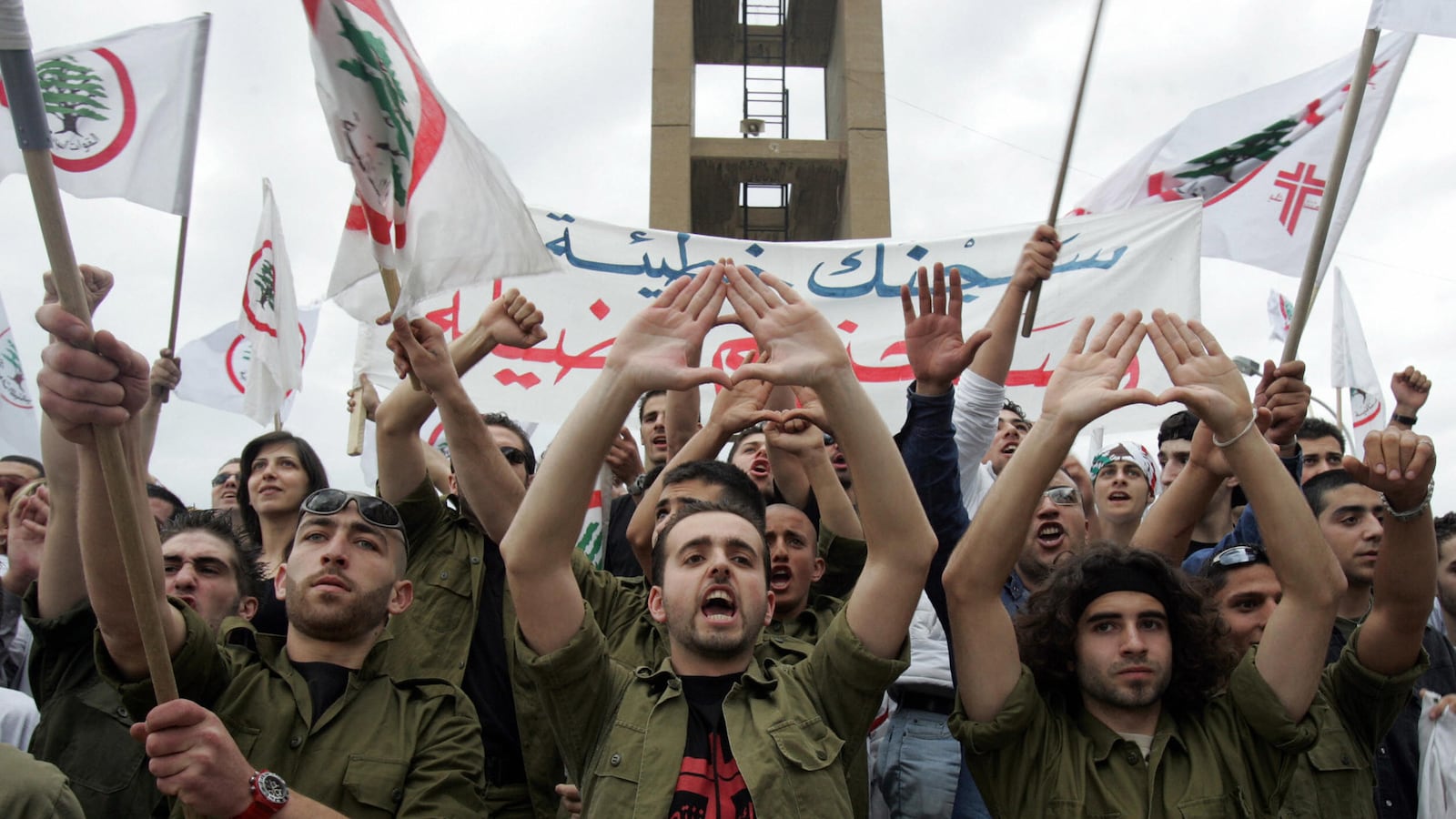RAS BAALBEK, Lebanon—Rifaat Nasrallah sits impatiently on a sofa in his home in the small village of Ras Baalbek sipping coffee and chain smoking Marlboro Lights. A handgun casually stuck in the waistband of his jeans, he says he’s only in town briefly; these days he’s been spending more and more time in the hills just outside his living room window, where he commands an all-Christian militia that he credits for keeping Islamist militants in neighboring Syria at bay.
In the doorway above him hangs a needlepoint portrait of the Virgin Mary, while on the mantle sits a framed photograph of the founder of the Shiite militant group Hezbollah, with whom he shares a last name.
“If it weren’t for us, it would be another Mosul for the Christians in Lebanon,” Nasrallah explains, referencing the mass displacement of Christians from villages surrounding Mosul following the takeover of the city by fighters for the so-called Islamic State this summer.
As advances by militant Islamic groups displace Christian communities from northern Iraq to western Syria, in Lebanon, Christians like Nasrallah are taking up arms, saying they refuse to succumb to a similar fate.
“We will never stand to not hear our church bells ring,” Nasrallah says, his arms crossed. “That will never happen here.” Ras Baalbek is just one of a handful of Christian villages in the northern Bekaa Valley not far from the Syrian border. While there have been a number of reports of Christians arming themselves in this region of Lebanon, Nasrallah’s men are one of the only Christian groups directly allied with Hezbollah.
Nasrallah, a veteran of Lebanon’s civil war, first organized his local militia after fighters with Jabhat al-Nusra, al Qaeda’s affiliate in Syria, began staging incursions into his town over the summer, ransacking local businesses and kidnapping residents. Since then Nasrallah says his men, most of whom he says also fought in the civil war, have managed to do what the Lebanese army had been incapable of: Secure the border with Syria just outside Ras Baalbek.
Just a few months later in August, only a few miles to the south of Ras Baalbek, the Syrian border town of Arsal was overrun by militant rebel groups including Jabhat al-Nusra and ISIS. The fighters attacked government buildings and took more than 20 Lebanese military and security personnel hostage. Since then, two have been beheaded by ISIS and one has been shot by Jabhat al-Nusra. The Lebanese government is still engaged in ongoing negotiations aimed at securing the soldiers’ release.
Nasrallah says it’s thanks to his men that something similar hasn’t happened in his town. But this small Christian militia isn’t acting alone; they coordinate directly with Hezbollah, going on joint patrols, and receive supplies and training from the group. Recently, as ISIS fighters joined the fight along Lebanon’s border, the Lebanese army has also begun working with Nasrallah’s men. But, he says he doesn’t receive nearly as much support from the military as he does from the Shiite militant group.
One of Nasrallah’s deputies, a man asked to only be identified as George, argues that Hezbollah is a natural ally for the country’s Christians. “It’s not about religion anymore,” he says. “We are sharing a common enemy now—ISIS is trying to kill both of us.” Hezbollah, an ally of Iran and Syrian President Bashar al-Assad, has openly participated in the Syrian civil war since 2013, fighting against rebel groups and extremist Islamists such as Jabhat al-Nusra and ISIS.
For the most part, residents of Ras Baalbek say they feel secure. On a Sunday afternoon, the center of town is bustling. Beneath a statue of Saint Thomas perched on the hillside above, teenagers linger in clusters at a central roundabout as families duck in and out of one of the only shops open on the Christian holy day. Just down the street, a new church is being built.
Dressed for church in high heels and skinny black trousers, Raghida Mirad, a mother of three grown children, says the tumult in Syria and Iraq has her feeling increasingly conflicted about her place as a Christian in the Middle East.
“I’ve started to feel less attachment to this country,” she says of Lebanon. “I’ve started to think more and more about leaving this place and all the headaches behind.”
Mirad says she continues to encourage her children to stay in Lebanon as they look to start families and build their futures, but increasingly, she worries perhaps that’s the wrong advice. “When they complain that there is no future for them here,” she confides after a long pause, “I worry they are right.”
“The truth is, we feel threatened,” her husband adds between drags on a cigarette.
But back at Nasrallah’s home, he says he has no patience for Christians willing to up and leave the region without a fight.
“We are not guests in the Middle East,” Nasrallah says., “We are the owners of this region.” He admits it’s difficult to watch Christians displaced from towns and cities that, like Lebanon, have been home to the religion for 2,000 years, “but I also feel as though they are betraying us,” he says.
He shot down the suggestion that Christians in other parts of the Middle East are forced to flee because they lack militias with powerful backers like Hezbollah to defend them. “The only difference between them and us,” he says, referring to Christians in other parts of the region who have fled in the face of violence, “is we have the will to fight.”




